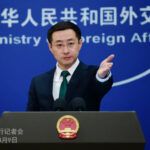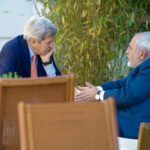The future of the Iranian nuclear deal is still uncertain
By Ariane Tabatabai | July 13, 2016
Members of the US Congress marked the one-year anniversary of the historic Iranian nuclear deal with actions that could help derail it. With Tehran eager to reap trade benefits from the agreement signed with six world powers last summer, the House of Representatives eroded some of those hopes by passing a bill that would bar US airplane maker Boeing from selling aircraft to Iran Air.
The attempt to veto the sale was a stark reminder that the deal signed on July 14, 2015 (officially, the Joint Comprehensive Plan of Action, or JCPOA) still faces many obstacles to achieving the goals its backers were striving for: trade and economic recovery (desired by Tehran), an end to Iranian nuclear proliferation (desired by the foreign powers), and in the bigger picture, greater peace and security for all.
In some ways, the nuclear deal appears to have led to great strides. So far, Iran has met its commitments under the agreement, which required the country to scale back nuclear development in exchange for sanctions relief. The International Atomic Energy Agency verified Iranian compliance with technical requirements, like removing the calandria from the Arak Heavy Water Reactor, shipping low-enriched uranium out of the country, decreasing the number of operating centrifuges, stopping uranium enrichment at Fordow, and limiting it at Natanz.
However, while Iran doesn’t appear to have violated the terms of the nuclear deal, it has conducted defense activities that the international community finds worrisome, for example, ballistic missile launches. Iran’s missile program was excluded from the nuclear deal, so by continuing to work on it, Tehran is not violating the letter of the agreement. Its actions do seem to violate the spirit of the agreement, though, and are also in breach of UN Security Council resolutions.
Iran, for its part, is far from satisfied with how things are going. To be sure, it has started to receive sanctions relief, but business is slow and the nuclear deal hasn’t produced the results citizens expected. Today, Iranians are itching for an economic recovery that is nowhere in sight. Hundreds of delegations from foreign countries went to Iran and signed memorandums of understanding to conduct business, but so far, Tehran has little to show for it. Many issues, from the sanctions that remain in place to the opacity of Iran’s banking sector, deter businesses from jumping into the Iranian market. While the Iranian government is aware of the issues—both those that stem from its own shortcomings and those posed by US law and the broader sanctions regime—it can’t overcome everything in such a short period of time.
Friendly fire. It doesn’t help that in both the United States and Iran, domestic forces are still attempting to torpedo the deal. The US Congress continues to try to put obstacles in the way of implementation, the most recent example being the legislation passed in the House of Representatives last week. Called the Financial Services and General Government Appropriations Act 239-185, it would block a Boeing plan to sell 80 aircraft and lease 29 to Iran’s flag-carrier airline, Iran Air, in a deal that would be worth $25 billion. Congress also has other irons in the fire, with bills under consideration that would impose sanctions on Iran for its human rights violations and support of terrorism, prohibit the purchase of heavy water from Iran, and further block Iran’s access to the US financial system.
To be sure, none of these efforts are likely to become US law. They are not expected to advance in the Senate, and if they do, the White House will surely veto them. But the determination by large numbers of US lawmakers to pass legislation that would violate the terms of the Iran nuclear deal is nonetheless troublesome. It makes potential investors and trade partners nervous about the viability of the Iranian market, and sends a signal to Iran’s increasingly disappointed population that the United States isn’t a reliable party to the deal.
The fact that the nuclear agreement removed Iran Air from the list of sanctioned entities was a vital element for Iranians, who have been prevented by decades of sanctions from replacing their flag carrier’s fleet. US lawmakers argued they were trying to block the Boeing sale because Tehran uses Iran Air to transport weapons to its proxies abroad and spread terror. But Iranians see the sanctions against their air industry as a safety concern. The numbers are grim: If you’re flying onboard an Iranian plane, you’re 100 times more likely than a passenger on one of the world’s major carriers to die in an accident. In the 25 years ending in 2014, Iran had 200 airplane accidents that killed more than 2,000 people. The Iranian fleet is on average more than 20 years old, with parts purchased second-hand. In fact, as of 2013, 60 percent of Iran Air’s airplanes were grounded because of technical issues.
In short, this new effort by Congress to prevent Tehran from benefiting from the nuclear deal hits very close to home for many Iranians. The Boeing deal, though, isn’t just important for safety reasons or its symbolic nature. It is also important because foreign businesses remain wary of entering, or reentering, the Iranian market. If Boeing and Iran Air are allowed to conclude their deal, it could set a precedent and reassure US businesses that it’s okay to engage Iran. If the agreement falls through, though, the message to other companies will be “don’t even try.” On Sunday, the chief executive of Boeing’s commercial jetliner division said that if Boeing couldn’t sell jets to Iran, other US companies “sure as heck” shouldn’t be allowed to either. Iran’s other main option as aircraft supplier is Europe’s Airbus, Boeing’s main competitor, but if Congress could stop Boeing, it could also stop Airbus from selling to Tehran due to American-made parts in its planes.
Much depends on the Boeing deal, both for the future of Iranian aviation and the nuclear agreement itself: If Iran can’t even get what was explicitly promised to it, what’s the point of staying onboard?
Strange bedfellows. US efforts to stop Tehran from collecting the fruits of its return to nuclear compliance benefit one group in Iran: The hardliners who warned against striking a deal with the United States in the first place. For now, moderate President Hassan Rouhani can hide behind the fact that the nuclear deal only entered its implementation phase six months ago, and that therefore there hasn’t been enough time to adequately assess its impact. But if current trends continue, Iranian moderates will have a difficult time selling the deal to more hawkish politicians and the broader population. Iran’s Supreme Leader Ayatollah Khamenei recently said that his country wouldn’t violate the nuclear agreement, but that it would “set fire” to the deal if the Americans tore it up, as so many Republican presidential primary candidates promised to do.
Today, last summer’s cross-party support for the nuclear deal is gone, and many in Iran wonder why their country signed it at all. Hardliners attack the Rouhani government and argue that the United States should never have been trusted. If prospects for economic recovery dim further, fewer Iranians may feel incentive to uphold their end of the deal. Possible business partners for Iran are concerned and deterred: Why jump back and invest time, energy, and capital in a market with an uncertain future? Even the presumptive Democratic presidential nominee in the United States, Hillary Clinton, has pledged to increase pressure on Iran, which would involve more isolation and sanctions—and likely indirectly affect the future of the nuclear agreement. On Tuesday, the New York Times reported that she was vetting retired Navy Admiral James Stavridis, a vocal critic of the nuclear deal, as a possible running mate.
Regional factors. Elements beyond what is going on in Iran and the United states will also play a role in the fate of the nuclear deal. Today, Iran is one of the few stable countries in the Middle East. The region is breaking down as central authorities collapse one after the other. Dialogue between Iran and Saudi Arabia would help resolve some of these conflicts, but Riyadh was never happy about the nuclear deal, which it sees as proof that it’s being abandoned by the United States, and that Iran has a free hand to pursue an ambitious regional agenda. Last week, Saudi prince and former intelligence chief Turki al-Faisal joined presumptive Republican nominee Donald Trump’s possible running mate, Newt Gingrich, at the annual meeting of the Mujahedeen-e Khalq, a cult-like Iranian exile group, where they called for overthrowing the Iranian regime. This is only the latest episode in the ongoing Saudi-Iran cold war. The split between the two regional powers, exacerbated by the nuclear agreement, has in turn dictated US policy vis-à-vis the Kingdom: Not wanting to feed Riyadh’s insecurity, Washington has supported efforts it would otherwise not condone, in particular with respect to Saudi Arabia’s bombing campaign in next-door Yemen. This has been tragic for Yemeni civilians, with nearly 3,000 killed in 2015 alone, and puts the United States in an awkward position. Iran’s regional policies, for example its support for the Assad regime in Syria, don’t help.
Keep it on track. In the one year since the Iran nuclear deal was signed, much has happened: Saudi Arabia and Iran cut diplomatic ties, Iran’s Revolutionary Guards captured and released US sailors, and Iranians voted in parliamentary and Assembly of Experts elections, which pulled politics towards the center with key victories for moderates and reformists and defeats for hardliners. Next year will be just as eventful: Americans will elect a new president, who will likely be more hawkish toward Iran than Barack Obama, and more inclined to put pressure on Tehran. Forces opposed to the nuclear deal and any détente between Iran and the United States will continue to try to sabotage it in both countries’ capitals. This makes it much more important to maintain and create new channels between Tehran and Washington, just as the US State, Treasury, and Energy Departments have done with their Iranian counterparts. This also makes it vital to keep both sides accountable for their commitment to the terms of the deal.
Together, we make the world safer.
The Bulletin elevates expert voices above the noise. But as an independent nonprofit organization, our operations depend on the support of readers like you. Help us continue to deliver quality journalism that holds leaders accountable. Your support of our work at any level is important. In return, we promise our coverage will be understandable, influential, vigilant, solution-oriented, and fair-minded. Together we can make a difference.
Topics: Columnists, Nuclear Weapons














